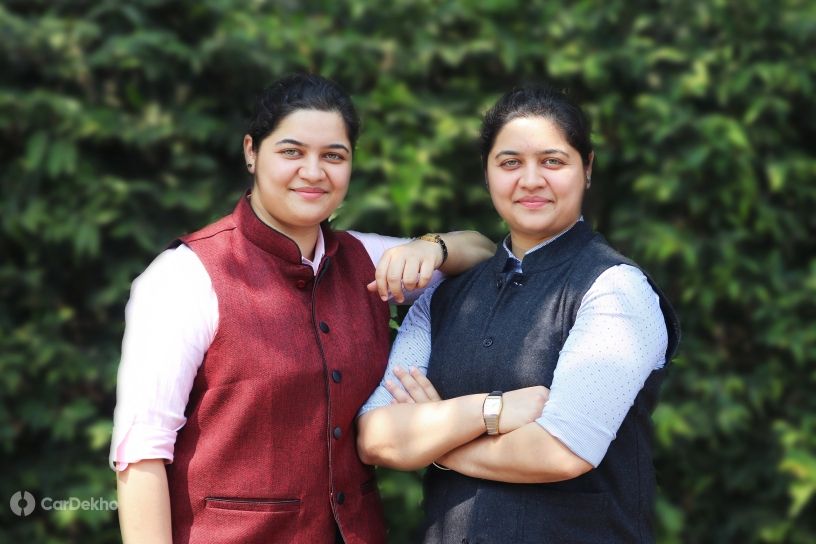These Sisters From Orissa Could Change Car EV Battery Tech Forever
Modified On Jul 14, 2021 03:08 PM By CarDekho
- 11.6K Views
- Write a comment
We spoke to them to find out more about their non-toxic, biodegradable batteries. Here’s how soon we could see them in passenger vehicles in India

Nikita and Nishita Baliarsingh, co-founders of the Bhubaneswar-based startup Nexus Power, have developed a lithium-free biodegradable battery cell made from proteins derived from crop waste after more than two years of research. It is set to hit the market in the next 2-3 years, and it could make India the epicentre of this future technology!
This battery cell is at the cutting edge of technological innovation and uses recently discovered conductive properties of proteins to store and release electric charge. Both electrodes and the electrolyte are made from bio-organic materials, and the aluminium casing is recyclable.
“At the moment, the focus is on building batteries for 2-wheelers and 3-wheelers,” says Nikita Baliarsingh, the COO of Nexus Power. With the help of local startups, they have been able to test their prototype battery pack in an electric two-wheeler. Pending patents prevented us from getting any range figures or other numbers, but Nikita tells us that their response was positive.
Nexus Power aims to supply battery packs to two-wheeler manufacturers such as Ather Energy and Ultraviolette. In the future it plans to build batteries for electric cars and even consumer electronics.


| Fast Charging Time |
Range |
|
| Nexus Power EV battery |
Less than 10 minutes |
450-500km (estimated) |
| MG ZS EV battery |
50 mins (0-80%) |
419km (ICAT*) |
| Tata Nexon EV battery |
60 mins (0-80%) |
312km (ARAI) |
*ICAT- International Centre for Automotive Technology
“Current tests look promising,” Nikita says. The company is experimenting with cell construction, and testing prototype cells to compare their charging times and other attributes against lithium-ion cells. “Our focus is to get as close as possible to lithium-ion cells so that we can use the existing infrastructure,” she adds. Tests indicate that charging speeds for the green battery could be on par with a lithium battery of similar capacity. From what she tells us, they could be a lot faster!
Nexus Power plans to undertake the production of its battery. “We want ancillary industries to come up in this space,” says Nikita. Without a doubt, this new tech allows for a wide range of economic opportunities for green battery component manufacturing and recycling. For the latter, Nikita says that there could be a buy-back scheme. You’ll be able to sell the green battery back to the manufacturer, where it will be dismantled and disposed of properly.
One way to recycle Li-ion batteries is to repackage and reuse them, and that’s exactly what Morris Garages’ (MG Motor) partner Exicom plans to do with used MG ZS EV battery packs. The carmaker has also teamed up with Attero for responsible end-of-life recycling of these packs.

The rapidly-growing startup is inching towards full-scale production despite the pandemic slowing it down. “We started back in 2019 with the idea to build a new kind of battery,” says Nikita. While the search for greener EV batteries is a global concern, Nikita and Nishita’s battery might help address an environmental issue closer to home.
Related: Top EV-friendly States In India That Offer The Best Incentives To Electric Car Buyers
According to reports, more than 23 million tons of crop waste is produced every year. Most of it is cleared by the farmers themselves with stubble burning, a process that worsens air quality not only in these areas but also in urban centres across the northern plains. This biomass is wasted fuel that can be used to make biogas, compost, or Nexus Power’s bio-organic batteries.
Also Read: Will You Drive A Hyundai Kona EV That's Powered By Human Waste?
Lithium-ion cells that power today’s electric cars are engineered for long range and high-voltage rapid charging. But producing Li-ion cell batteries takes a toll on the environment. Every step of the way--lithium mining, transportation, cell and battery manufacturing--causes massive carbon emissions. In addition, a used Li-ion battery is toxic to the environment if not recycled properly.
On the other hand, Nishita and Nikita’s battery gets a carbon-saving start at the beginning of its lifecycle, since it helps recycle an abundant waste. The two sisters and the Nexus Power team are working to minimise the environmental impact of each step of battery production and recycling.
Related: MoRTH’s Latest Proposal Could Make EVs More Affordable
Meanwhile, the automotive industry is almost unanimously moving towards electric vehicles and hybrids. In India, you can get state and central government incentives when buying cars such as the Mahindra e-Verito and Tata Nexon EV. On the higher end of the budget scale, we have the Hyundai Kona, MG ZS EV, Jaguar I-Pace and Mercedes-Benz EQC. The market is likely to keep growing, but we also expect the higher-end cars to depreciate and become more affordable used cars.

“We plan to launch the product globally,” says Nikita, adding that the timeline for it has not yet been decided. We might get to see the battery enter production after 2022. Nexus Power will be able to tell us more after the pilot projects are conducted to test the battery in real-world conditions. Watch out for more updates in our news section.
Would you like to see this India-made green battery in a production car soon? Let us know in the comments below.
6 out of 6 found this helpful














